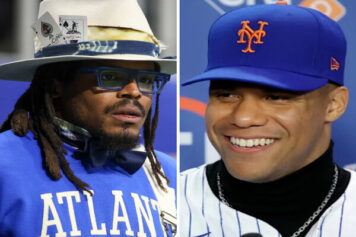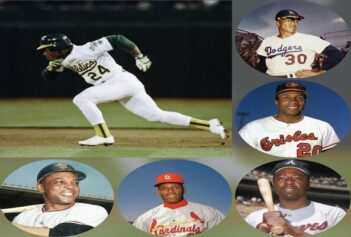So Jonathan Papelbon (and allegedly other Red Sox) took Toradol shots back in the day. Alex Rodriguez (allegedly, again!) had Anthony Bosch, of Biogenesis of America, come to his house to shoot him up with PEDs. Mike Piazza claims in his new book, “Long Shot,” that he experimented with amphetamines, but never crossed into the banned steroids arena. Curt Schilling claims that it was “suggested” to him while recovering from an injury during the latter stages of his career, “that at my age and in my situation, why not?” Ryan Braun’s name came up, yet again, in an “elevated levels of testosterone” conversation, when he was recently “linked” to a clinic (again, Biogenesis of America) under investigation by MLB.
And that’s just baseball.
It’s as omnipresent as Taylor Swift has unfortunately become in pop culture. The suspicion of the usage of banned or illegal substances for substantial and unsubstantiated reasons has gone from an inconvenient truth to an inescapable one.
At this point, how do we deal? Every day–almost literally—there seems to be another story attached to another athlete being accused or pre-indicted of using something to get a leg-up on the comp or to enhance his performance.
F-that. I’m tired. We all should be. From building Lance Armstrong up to be this god, to turning a collective blind-eye on the McGwire/Sosa HR derby, the days of innocence (or our belief in it) in sports is done. Leaving us with only one of two ways to move forward while keeping our sanity in tact.
We can either make the cynical leap to believing every athlete, in some way, is guilty, or we can quit caring whether or not any of these athletes are innocent. New rules, new law—let’s make it a non-issue.
Since the court of public opinion now has equal, if not greater, footing than benefit of doubt, those are the only two options left to move forward in this era. That is, if it’s our plan to continue to take sports—all sports—at face value. Braun, Rodriguez, Ray Lewis: whether they used PEDs to recover from injury or gain an advantage over/on the playing field…or if their names keep popping up on documents and/or reports…or if urine tests come back positive, tainted or negative, it doesn’t make a difference. You’re all guilty or we don’t care if any of you are innocent. It’s better this way.
Understand that the truth is never going to come out or be believed until the athlete admits it. It took Lance Armstrong 20 years to finally come clean. Why should we have to endure that type of mental torture, or be held in that type of holding pattern for that long a period of time, to determine whether or not someone’s performance is “legit”?
At this point, since the relationship between athlete and medicine (and the doctors who provide the medicine, drugs, PED, HGH, etc.) and the owners of sports teams seems to only act in the best interest of self, the public needs to finally act in its/our own best interest and choose either pervasive cynicism or an apathy for player innocence/guilt.
No more “who’s clean/who’s tainted?” debates. This should no longer be about moralistic prudence. Those days are so 9.79 seconds ago. No one is suspect any longer, because we don’t care. Or everyone is suspect across the board.
So, for instance, look at LeBron James, who has a body mass that is easily transferable to a tight end/middle linebacker/defensive end, but the skill set and agility of a point guard. Following our new modus operandi – created in our (the fans) best interests – he’s either using something “extra” to make all of this happen or we don’t give a damn if he is or isn’t. Usain Bolt has made breaking world records look easy. The only thing left for him to do is run backwards across the finish line while laughing at the suckers who thought they had a chance to beat or challenge him. He’s either gotten medical assistance or we could care less. It is what we see, nothing else.
Same with Michael Phelps. Same with Mike Trout. Same with Lionel Messi.
Anytime someone breaks a sack record (JJ Watt) or is on pace to shatter it (Aldon Smith had 19.5 by Week 12), he’s on something. Adrian Peterson (despite what Bill Simmons wrote, recently, in a great Grantland piece) defies medical science by coming back three months earlier than normal from an injury that should have made him miss half of the season, so he’s on something. Miguel Cabrera wins the Triple Crown, the first time anyone has since 1967—he’s on something. Russell Westbrook is more athletic than any point guard we’ve ever seen play in the NBA…on something. Peyton Manning plays at an MVP-level after missing a year with a fourth neck surgery…on something. Anytime Rob Gronkowski breaks a reception or TD record for tight ends or Calvin Johnson breaks a Jerry Rice receiving record, they’re all on something, too.
Same with Shawn White. Same with Rajon Rondo. Same with Lindsey Vonn.
Not even kids are exempt: Robert Nkemdiche, the No. 1 HS football recruit in the nation, is 6’5, 260 and only 18 years old. That’s just not natural… he’s had help. Kasey Hill, the No. 9 ranked basketball player in the country, at 6’0” who is dunking on people in traffic and has more speed than Tyson Gay? Not natural, either. He could not have been born with that,…but you can enhance it. He, too, has had help.
Missy Franklin? Yep. A freshman wins the Heisman for the first time ever? Uh, duh.
Yes, it’s jaded and a cynical space to exist in. And yes, it quite possibly could be the most detrimental and disturbing attitude to have for the entire culture of sports, if this thought process formed into a consensus. But what other choices do we have as fans? Better yet, what other choices has sports left us with?
Do we trust politics and politicians? No. But we still vote for them and still put some form of faith in their willingness to serve for our well-being. Sports, at this point in the game, shouldn’t be any different.
The games sell us on authenticity. Sports are one of the only unscripted forms of entertainment left. It’s supposed to be real. And now that it seems that every other day we are constantly reminded that sports are not so real, we should adjust how we think and feel about sports and all of its participants, accordingly.
There’s a saying I heard as a child that is very appropriate for this moment: When an incident hits home, it forces you to start looking into things and not pass them.
How many more incidents in sports have to hit us in our heads and hearts for us to finally realize that the real game being played is the one being played on us?



